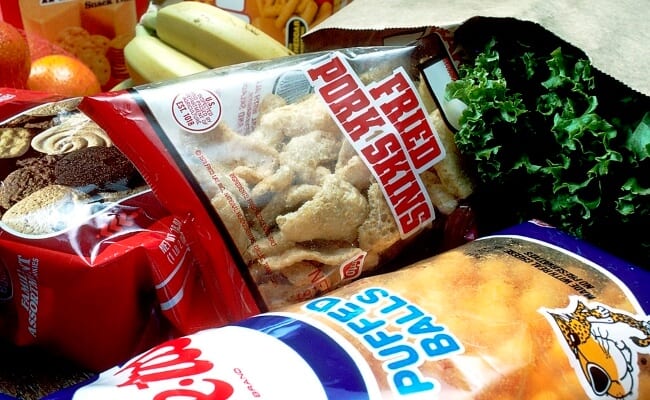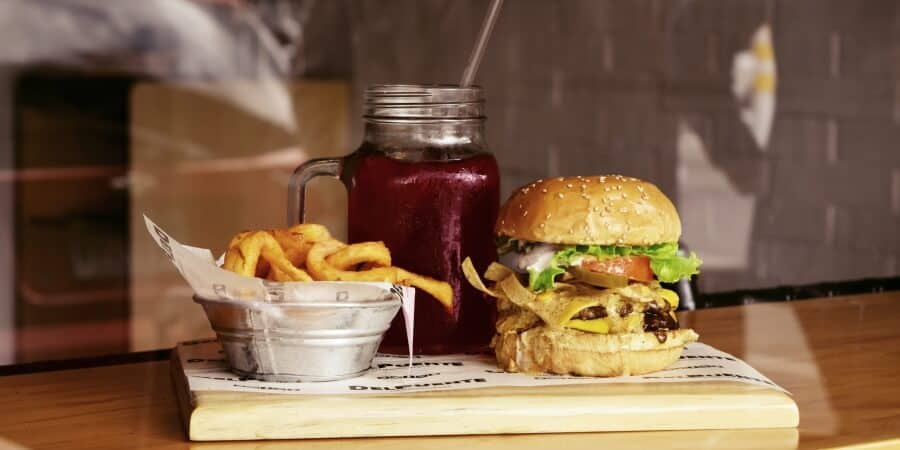When I was younger, soft drinks, alcohol, potato chips, and pastries were a regular part of my diet. So were pre-packaged, microwaveable and easy-to-make meals.
It wasn’t until the end of 2011 that I realized this stuff was bad for me. Of course, consuming junk like that was negatively affecting my weight, but I never really wondered how it was affecting my health.
2011 was the year when I first discovered the connection between nutrition and health. And it was the first time I heard the term ‘processed food.’
Learning about the negative health effects of some foods gave me motivation to start cooking my own meals, but it also taught me that the topic is more complicated than it seems.
Dive into this article to learn about which processed foods you should really avoid.
What Is Processed Food?

While we automatically think of potato chips and frozen pizza when we hear the word ‘processed,’ the term actually refers to ANY food that has been changed in some way before consumption. Cut up vegetables, milk, and whole meal bread are also processed foods.
What makes some foods worse than others though is how much they have been altered from their natural state:
- Bagged leafy greens, frozen fruits, and canned tuna have been minimally altered for the sake of convenience and to preserve the micronutrients they contain.
- Pasta sauces, sweet yogurts, salad dressings are more processed as additives like preservatives, spices, salt, sugar, etc. have been added to enhance flavor and texture.
- Chips, crackers, breakfast cereals are even more heavily processed to turn them into ready-to-eat foods.
- Frozen pizza and microwaveable meals are the most heavily processed as they are full of additives required to preserve them long-term.
As you can see, not all foods that are processed are bad. Minimally altered foods can definitely have a part in a healthy diet. It’s the heavily processed foods that you should avoid.
Why Should You Avoid Heavily Processed Foods?
Ultra-processed foods have additives such as sodium, fats, sugars, flavors, and colors added to them for various reasons. For example, sodium acts as a preservative, helping foods last longer. Sugar is used in the fermentation process of yogurt, bread, beer, cheese, and others. It also adds bulk and texture. Fats make foods more palatable for us.
Although some additives play an important role from the food science and technology perspective, consuming them in excess can cause a lot of chronic health problems, such as obesity (1), high blood pressure, and heart disease (2).
Secondly, heavily processed foods are very low in essential nutrients as vitamins and minerals get destroyed during the modification process. This puts your body at risk of serious nutrient deficiencies that can be very harmful to your health.
How to Avoid Processed Foods?

As you saw above, not all processed foods should be banished from your menu as not all of them are bad for you. The trick is to limit or eliminate the intake of foods loaded with additives that are poised to lead to health problems.
Here are some steps you can take to avoid heavily processed foods:
Carefully read food labels
Reading the labels is the easiest way to detect whether a food is processed or not. Under the law, manufacturers are required to list all the ingredients in order of quantity to improve transparency.
First rule of thumb:
The longer the ingredients list, the more processed the food. Pick items with the least ingredients, ideally less than five.
Second rule:
If you can’t pronounce the words on the label, skip the product and pick something else.
Also:
- Limit foods with added sodium (salt).
- Watch out for ingredients ending with “-ose” – these are just fancy code words for sugar.
- Avoid anything with high-fructose corn syrup.
- If the label of a product lists hydrogenated or partially hydrogenated oils as ingredients, avoid it – it contains trans fats, which should be limited.
Steer clear of white foods
‘White’ foods are some of the most highly processed foods in the world, especially in the US. White bread, pasta, and rice are almost void of all nutrients and fiber as the bran and germ layers are removed during the modification process. Additionally, the flour used to make white bread is bleached with different chemicals, a practice that is wide-spread in the United States but banned in the European Union.
Avoiding anything white can help greatly limit your consumption of processed foods – always choose whole grain/whole wheat varieties over white products.
Increase your consumption of fresh foods
The best foods come without ingredients lists! Locally grown fruits and vegetables that you can find in the local market are your best bet when looking to embrace a healthy lifestyle.
If you’re not used to eating fruits and veggies, start with adding fresh foods to some of your meals. For example, an apple with breakfast or carrot sticks at lunch are a great way to make your menu healthier. Ultimately, half of your plate at lunch/dinner should be filled with fresh produce.
In addition to increasing your consumption of fresh foods, look for those that have been grown organically. Organic foods are grown without pesticides or harmful fertilizers, which makes them better for your health.
Cook Your own Meals
(Fast food) restaurants use a lot of processed ingredients when cooking their foods. Pre-packaged and microwaveable dishes are also highly processed and full of salt, fats, and sugar to make them taste better.
Instead, start cooking your own meals. Start with easy-to-make dishes such as mac and cheese with whole wheat pasta or Shepherd’s pie with homemade mashed potatoes.
Get the best kitchen appliances to help you cook good meals:
What Type of Processed foods You Should avoid

The problem with most processed foods is that they contain high levels of hidden sodium, sugar, and fat, which can cause various health problems. Here’s a list of the highest processed foods you should avoid:
• Processed meats – Processed meats like bacon contain sodium and saturated fats in large quantities which are the leading causes of heart disease and obesity. Additionally, most meats like sausages, hot dogs, and ham contain harmful preservatives.
• Fruit snacks – Fruit snacks contain a lot of added sugars which can not only lead to diabetes but also result in weight gain. These snacks also have gelatinous ingredients which easily stick on the teeth and encourage tooth decay.
• Dried fruits – Although dried fruits offer some health benefits such as aiding digestion or providing essential nutrients, these should be consumed in moderation. Dried fruits have a high calorie and sugar content which is not only bad for your waistline but also a threat to your dental health.
• Instant ramen – Instant ramen are one of the worst foods to eat on this planet! They contain high levels of sodium, which can lead to heart problems if consumed in excess. And other than simple carbs, instant ramen is virtually nutrient free.
• Granola bars – Granola bars are all the rage right now but most store-bought varieties aren’t much healthier than candy bars. In addition to containing lots of sugar, these treats are full of preservatives that are a recipe for health complications.
• Ketchup – Although it tastes great with fries and meat, ketchup contains little nutritional value. It’s full of salt and sugar, which can lead to both weight and cardiovascular complication over time.
• Frozen meals – Frozen dinners may be convenient on busy work nights, but they are unusually loaded with added sodium, fat, and sugar – ingredients that do not have a part in a healthy diet. Additionally, they are short on nutritious items such as veggies and salad greens.
List of processed foods to avoid
Here are some common processed foods that are best to avoid or consume in moderation:
- Sugary drinks, including soda, energy drinks, and fruit juices with added sugars.
- Processed meats, such as deli meat, sausage, and bacon.
- Snack foods like chips, crackers, and pretzels are often high in salt, fat, and calories.
- Frozen meals and dinners are often high in sodium and preservatives.
- Sweetened breakfast cereals that are high in sugar and low in fiber.
- Fast food and fried foods are high in calories, saturated fat, and sodium.
- Baked goods like pastries, cookies, and cakes are often high in sugar, unhealthy fats, and calories.
- Instant noodles and packaged pasta meals are often high in sodium and low in nutrients.
- Processed cheese and cheese products like cheese spreads and cheese dips.
- Margarine and other hydrogenated vegetable oils are high in trans fats.
Ready to ditch processed foods?
Processed foods are convenient as we lead increasingly busy lives, and not all of them are bad for you. Bagged leafy greens, whole meal bread, and frozen fruits are just a few examples of ‘processed’ foods that are healthy.
Unfortunately, convenience has its price. Most processed foods are loaded with high amounts of sodium, sugar, and fat, which can lead to all sorts of health problems such as obesity, diabetes, heart disease, and more.
The easiest way to eliminate processed foods from your diet is by reading labels and avoiding anything with long ingredient lists. Increasing the consumption of fruits, veggies, and whole grains and cooking your own meals from scratch will also make your menu healthier.

